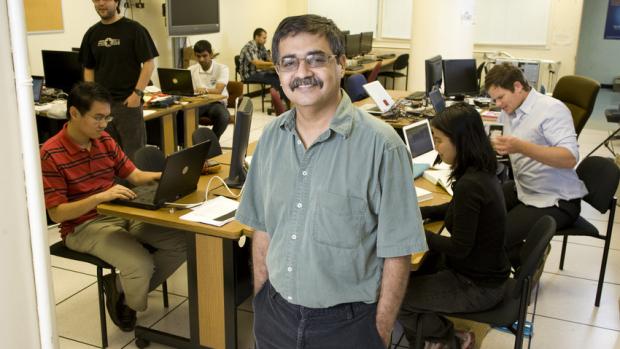A Bridge to NYU Tandon
A Computer Science Bridge for Non-Computer Scientists

Professor Nasir Memon conceived of a program to prepare students without a computer science background for a Masters program in computer science
Conceived by Computer Science and Engineering Department Head, Professor Nasir Memon, the summer pilot of "A Bridge to NYU Tandon" — a computer science bridge for non-computer scientists — drew a diverse group of students. There was the Princeton psychology major who always loved computers but was sidelined by dreams of Olympic pole vaulting; the mechanical engineer who landed a plum job on Wall Street but still dreamed of developing video games; the economics and anthropology student who saw the chance to create online education opportunities in underdeveloped nations; and the music technologist who understood that deep computer science knowledge would open a wide variety of career options.
They and the other intrepid, intellectually curious members of the Bridge Program had each come to realize that melding their own fields of expertise with solid skills in areas like artificial intelligence, big data, or cybersecurity could open up vast new creative and career opportunities. Some had already tried occasional computer science offerings from community colleges, pricey coding academies, or the Web platform Cousera. None of those options proved sufficient, however. While learning to code is a relatively simple and accessible proposition, the members of this highly motivated group wanted more; they wanted, simply put, to open doors that only a master’s degree from a respected university could open.
One roadblock stood in their way. For a wide variety of reasons, none of them had earned a bachelor’s degree in computer science. Some were introduced to the field late in their undergraduate careers; others mistakenly believed that computer science was only for geeky loners who did not enjoy working with other people. A few female participants, warned of a field rife with gender bias, were dissuaded from even trying.
“I taught myself HTML when I was 12,” Meredith Mante, the Princeton grad and former pole vaulter, recalled. “I gave an 8th grade career speech about wanting to be a programmer. But there were no computer science courses at my high school, and when it came time for college, it never even crossed my mind that majoring in computer science was a possibility.”
“I realized that just because others have told me I’m more of a ‘people person,’ that should not mean I can’t also be a ‘computer person,’” another participant, Yin Mei, who, like Mante, holds a bachelor’s degree in psychology, said. “Because in the end, computers are supposed to help people, right?”
Ready to make the leap into a master’s program, the participants realized that just to prepare for the ambitious move could take at least a year of study and $20,000. There seemed to be little other option if they expected to keep up with students who had spent four years earning B.S. degrees in computer science, however.
“I had no background in computer science whatsoever,” Lucia Yu, who studied economics and anthropology in college, explained. “Despite some similarities between economics and math, I knew I would need to learn a whole different mode of abstract thinking and a new framework for problem-solving.”
They were heartened to hear of the Bridge Program, an intensive course that would cover in 15 weeks what would have taken two years of undergraduate work.
Isaiah Genis, who earned his bachelor’s degree in math and economics, began working at the respected consulting firm Booz Allen Hamilton midway through the program; his aim was to delve deeply into topics like financial technologies and data science which greatly interested him. “One day Tandon professor Daniel Katz-Braunschweig compared the Bridge Program to the deluge of water that would hit you if you tried drinking from a fire hose,” Genis said. “That’s a great analogy for the deluge of information we received.”
I have no doubt that those who complete the Bridge Program are well on their way to making vital contributions in whatever endeavor they chose.” — Professor Nasir Memon
Alex Olea, a former history major, concurred that the program — which is offered online for maximum flexibility at a reasonable cost of $1,500 — packed an astonishing material into a short period of time. “Although majoring in history requires enormous amounts of reading and focus, it would be fair to say that this was the most challenging 14 weeks of my academic career,” he said. The payoff was worth it, however, he states unequivocally.
Some of the Bridge Program’s graduates took advantage of that perk to enroll as full-time master’s students immediately, while others chose to keep their regular jobs while studying part-time. All, however, have their eyes on their ultimate goals.
Mante — who was encouraged to try the Bridge Program by one of her professors, Anthony Scordino (Vice President of Information Technology at Westchester Community College and himself a Tandon alum) — said, “I now know that beyond being a programmer, I want to be a computer scientist, and beyond building applications, I aspire to work on the systems that actually run the applications.”
“Computer science can be a tool for institutional, social, and economic empowerment,” Yu, who hopes to work in the arena of social and economic development, said. “Data collection and network security are becoming increasingly indispensable in meeting development challenges, going beyond the alleviation of absolute poverty and into the realm of efficient distribution of abstract resources such as justice or democratic ideas ... Technology is not simply a means to provide first-world convenience and generate unidirectional wealth.”
Whatever their goals, the Bridge graduates agree that they’ve taken a valuable step in securing their futures: The U.S. Bureau of Labor Statistics asserts that demand for those with computer science backgrounds will rise 12% over the next decade, to nearly a half million jobs.
“Computer technology touches almost every field one can think of today — from transportation, education, and medicine to entertainment, business, and public policy,” Professor Memon elaborated. “I have no doubt that those who complete the Bridge Program are well on their way to making vital contributions in whatever endeavor they chose.”





